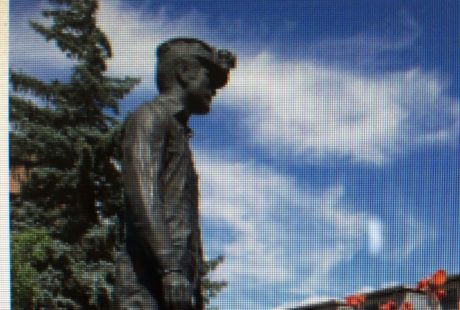06
Jun
Sunday Wanderings
- By Eileen Vandergrift
- 6 Comments
 Yesterday I spent the afternoon ‘exploring’ a little community near my new hometown of Boulder. On the main street, busy with shops, cafes and more gloriously stalky flowers than I could even name, there was a bigger than life bronze dedicated to the town’s coal miners. The plaque read…” TO LIVE IN THE HEARTS WE LEAVE BEHIND IS NOT TO DIE”. While this sentiment is ‘familiar ‘ enough, I’m trying to think about HOW we can be an ‘afterlife’ for those who have shaped us and still be open to the shaping of memory that goes on well beyond their lives with us?
Yesterday I spent the afternoon ‘exploring’ a little community near my new hometown of Boulder. On the main street, busy with shops, cafes and more gloriously stalky flowers than I could even name, there was a bigger than life bronze dedicated to the town’s coal miners. The plaque read…” TO LIVE IN THE HEARTS WE LEAVE BEHIND IS NOT TO DIE”. While this sentiment is ‘familiar ‘ enough, I’m trying to think about HOW we can be an ‘afterlife’ for those who have shaped us and still be open to the shaping of memory that goes on well beyond their lives with us?
Maybe, if we are going to have an ongoing relationship with people who are no longer with us concretely, we have to remember that it requires us to hold them in memory as we actually experienced them so that we can return, sometimes again and again, to moments with them whose meanings keeps developing as we do.
Resisting the pressure, from ourselves and others, to remember people simply… ‘good’, ‘bad’, ‘this’, ‘that’… protects memory as a living possibility for connection to what we might still have to learn through our lost relationships.
While uncomplicated stories may be convenient, I think that they inevitably lack the richness of our ‘real relationships’ with complex people. If we want to feel a lively connection to someone, even in their absence, I think the remembrance of them has to be faithful to who they actually were. I imagine that a lot of us get ‘stuck’ in grief because we are trying to let go of an idea of a person rather than the person themselves.
What do you think???


June 8, 2016
What lovely encouraging words. It is a gift to have a different perspective on the pain that seems to have moved in and set up shop. I will continue to seek and honor what was…..what really was. Thank you.
June 8, 2016
You are so welcome, Lauren. We all need encouragement PLUS, bigger and bigger perspectives to inhabit.
I think that sharing our different perspectives is a real gift where moving through pain is concerned.
When ‘pain moves in and sets up shop”, I’d say, don’t pull away, lean into it! Be open to what your pain is trying to tell you.
I spent 30 years in Pittsburgh and I remember going to hear Fred Rogers speak about ‘childhood loss’ one evening.
He said, “Anything mentionable becomes manageable.” Pain can be made manageable when we honor what was real. Letting ourselves speak the truth of our experience,
we usually find that our pain begins to shift and it can open onto many other things…sadness, laughter, curiosity, confusion and new memories. When pain is not fluid, we feel stuck.
I think we often need to tell our stories, again and again, from multiple perspectives. When we do this, broader perspectives and deeper understandings can expand our capacity to bear our pain and our losses!
June 9, 2016
I have been thinking about “Afterlife” a lot lately. For instance, the notion of reincarnation holds some confusing wisdom to me. If we are reborn without any memory of our past life, then are we really ourselves? While it can sound like a negative question, there’s actually some comfort in it: in a sense, it doesn’t matter whether it is “me” or not that gets reborn after I die. So many of us want another chance to play at life, but newborn people are getting a fresh chance at life everyday. Who’s to say that the spirit that inhabits your newborn son isn’t the recycled spirit of your passed-away father? And in the end, it doesn’t really matter, because the memories are wiped clean for the passed, and live on through their loved ones, but new stories are being made and cycling through and going on. So when it gives me comfort to think of someone’s spirit living on in a new form, I know that in a way it is true. In fact, in many ways it can be seen as true.
June 11, 2016
There is so much to respond to here! For now, let me just say that, I believe with every cell of my being, that finding ways to hold people and things inside of us, despite the external reality of loss, is one way of BEING their ‘afterlife’ and honoring their significance to us, as they continue to be an important part of who we are. I also believe that that’s a psychological understanding of a part of what happens in ‘good grieving’…but it is a goal not easily won or ever completely accomplished. There are many ways people find comfort in considering ‘afterlife’…religious, social, familial and psychological…whatever allows us to feel that we can accept that what has happened is now a part of us, and at the same time, bigger than we can understand, likely inclines us to lean towards wonder in ways that might challenge despair.
And, on the “who says” question you raise, be very astute to the things that people “say”, their way doesn’t have to be yours and no one knows better than you what YOU need to make sense of your losses. They are yours!
June 17, 2016
People who are not still “concretely with us” can /do change in our memories because we change and our perspective and understanding of them gets altered at the same time. Growing and having new experiences can lead to greater understanding of a lost one and create even an afterlife for them!
June 17, 2016
Gosh, this version of an ‘afterlife’ has been on my mind a great deal lately. I’m coming up on the 47 year mark since my dad died but I notice that I tell the story of his immigration more regularly than I have in a long time probably the result of our national conversation).
I have noticed that my understanding of his wish for a better life, and the courage he mustered in an effort to make it happen, has softened my critical feelings about his not being very emotionally available to us as children. I’d say that I have a somewhat different father today than I had, say 10 years ago, because I can see how he might have had to defend against a lot of tender feelings to have separated so completely from the people he loved and had to leave.
Submit a Comment